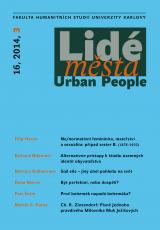Být perfektní, nebo dospělí?
Dnešní studenti ve světle divadla utlačovaných
DOI:
https://doi.org/10.14712/12128112.3430Klíčová slova:
theatre of oppressed, action research, neo-liberalismAbstrakt
The article presents the data collected during the application of the theatre of the oppressed method among the students of the Faculty of Humanities, Charles University of Prague in 2012–13. Students chose the theme of the pressure to “be perfect” as a result of their team work. The theatrical plays that resulted out of the group work were presented by the forum method; focus group meetings and individual interviews with students followed. Based on this experience, there are several topics discussed in the article: The method of the theatre of the oppressed is analysed as one of methods of action research; The pressure to “be perfect”, which was chosen as a main form of oppression in students’ group, is analysed in the context of the political changes in the Czech Republic after 1989. The last question discussed is to what extent is it possible to use this kind of data in the “traditional” interpretation of social reality in conventional qualitative research.
Stahování
Publikováno
Jak citovat
Číslo
Sekce
Licence

Tato práce je licencována pod Mezinárodní licencí Creative Commons Attribution-NonCommercial-NoDerivatives 4.0.


